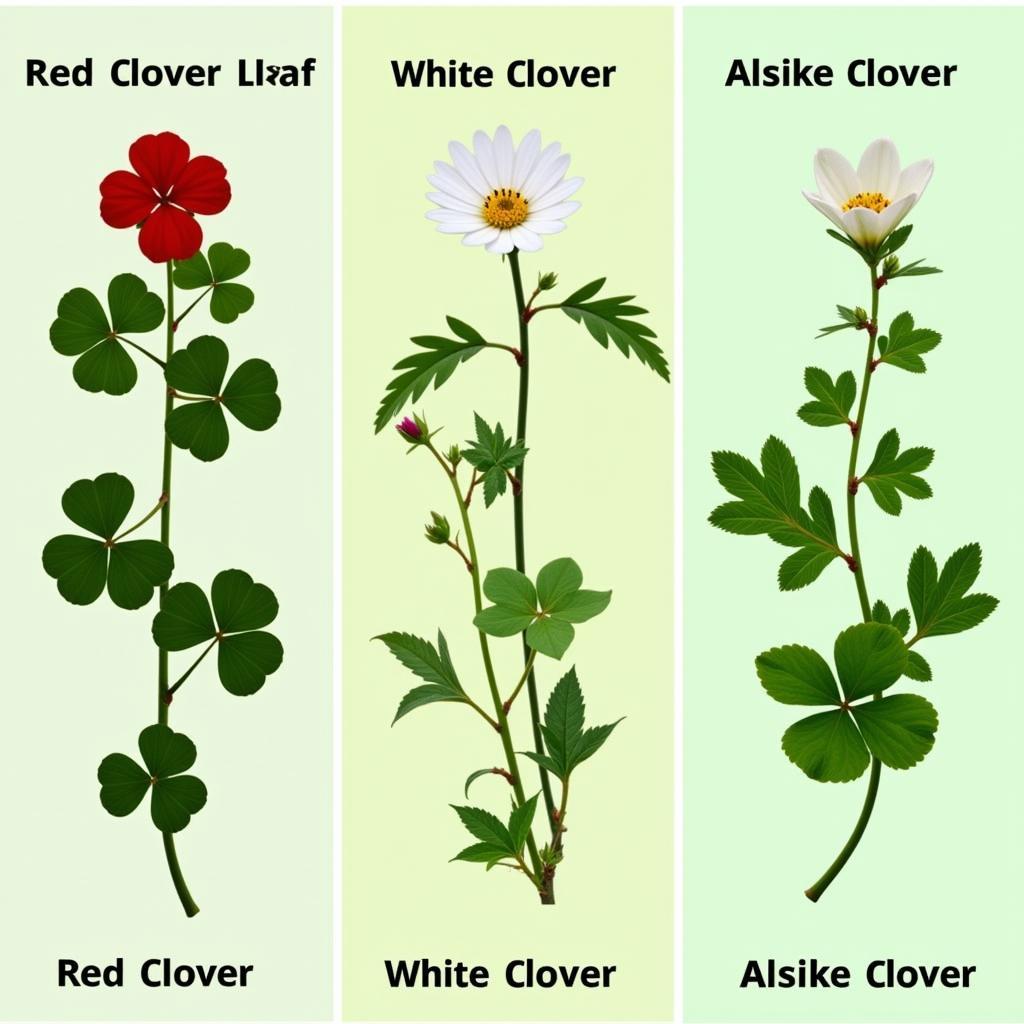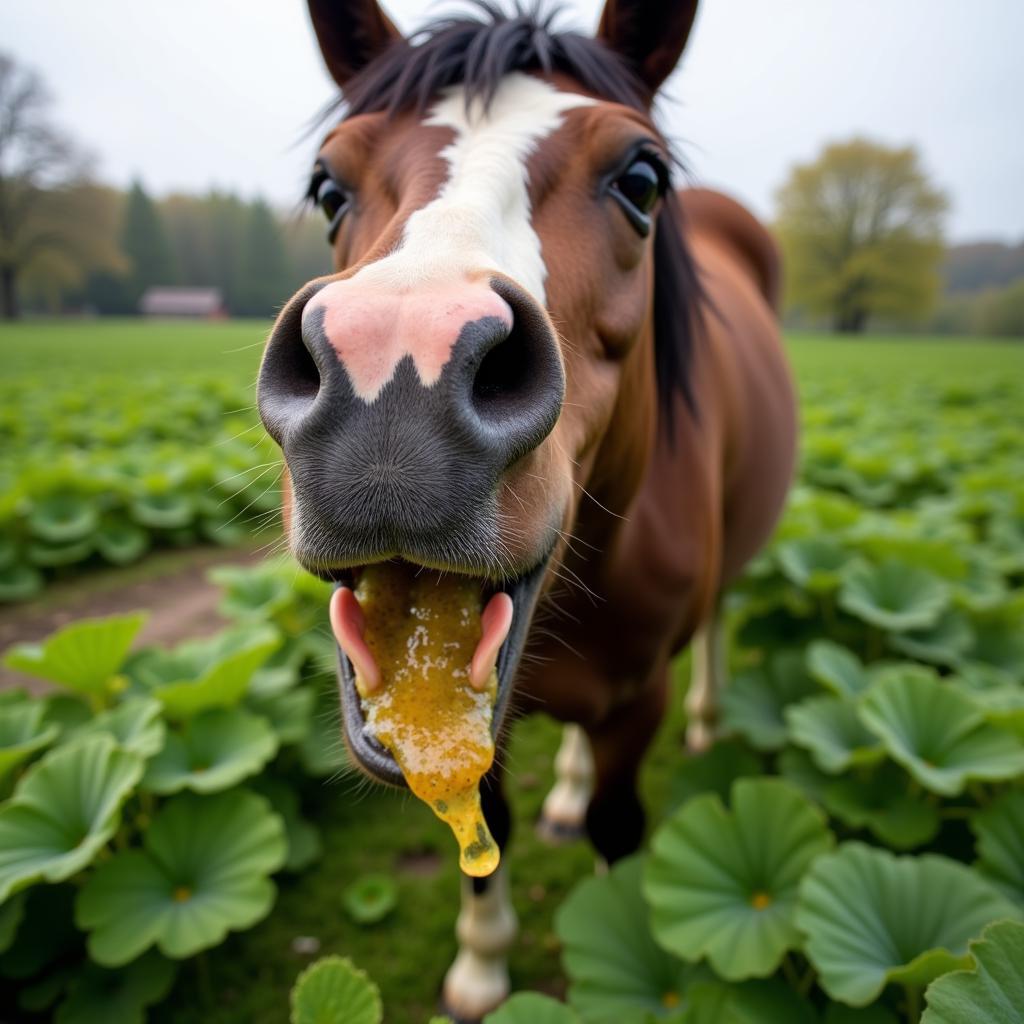Clover. That vibrant, green, three-leafed plant often found carpeting pastures. But can horses eat clover? The answer, like many things regarding equine nutrition, isn’t a simple yes or no. It depends on the type of clover, the quantity consumed, and the individual horse. Let’s delve into the details of clover and its impact on your horse’s diet.
The Nutritional Value of Clover for Horses
Clover can be a valuable source of nutrients for horses, offering protein, fiber, and essential vitamins and minerals like calcium and vitamin A. It’s often more palatable than grass, leading to increased forage intake, which can be beneficial for underweight horses or those with picky appetites. However, certain types of clover can pose risks, which we will discuss later.
Specifically, red clover is known to be rich in protein, which contributes to muscle development and overall health. This can be particularly useful for growing horses, broodmares, and performance horses with higher protein requirements. White clover, while also nutritious, generally has a lower protein content than red clover.
Types of Clover and Their Effects on Horses
Not all clovers are created equal. Some varieties can be beneficial, while others are potentially harmful.
Red Clover: A Mixed Bag
Red clover, while nutritious, can present some challenges. It contains coumarin, a substance that can act as a mild blood thinner. In large quantities, this can lead to excessive bleeding if the horse is injured. Additionally, red clover can be prone to a fungal infection that produces mycotoxins, which can be toxic to horses. If considering red clover as part of your horse’s diet, ensure it is free of mold and fed in moderation.
White Clover: Generally Safe
White clover is typically considered safer for horses than red clover. It has a lower coumarin content and is less susceptible to the mold that produces harmful mycotoxins. It still offers valuable nutrients and can be a good addition to a horse’s pasture, particularly when mixed with grasses. Overgrazing of white clover, however, can lead to issues like slobbers, which is discussed further below.
Alsike Clover: Avoid This One
Alsike clover should be avoided entirely. It contains a toxin that can cause photosensitization, making horses extremely sensitive to sunlight. This can result in severe sunburn, liver damage, and even death. Learn to identify alsike clover and ensure it’s not present in your horse’s pasture.
 Identifying Different Types of Clover
Identifying Different Types of Clover
“Alsike clover is a serious threat to horses,” warns Dr. Emily Carter, DVM, an equine veterinarian with over 20 years of experience. “It’s crucial to eradicate it from pastures and hay to prevent potentially fatal health problems.”
Can Horses Eat Clover in Hay?
Clover is often found in hay mixes. While small amounts are generally safe, large proportions of clover, particularly red clover, can pose the same risks as grazing on fresh clover. If you’re unsure about the clover content in your hay, consult with a veterinarian or equine nutritionist. Perhaps you could consider horses beans as a safe alternative to supplement your horse’s diet?
The Problem with “Slobbers”
Overgrazing on certain types of clover, especially white clover, can lead to a condition called “slobbers.” This is caused by a fungus that grows on the clover and produces slaframine, which increases salivation. While generally not harmful, excessive slobbering can be messy and uncomfortable for the horse.
 Horse Exhibiting Slobbers
Horse Exhibiting Slobbers
“Slobbers is usually more of a nuisance than a serious health concern,” explains Sarah Miller, Equine Nutritionist. “However, it’s a clear indication that your horse is consuming too much of a particular type of clover and you should adjust their grazing management accordingly.” You might also be interested in learning more about bees and horses.
Managing Clover in Your Pasture
Proper pasture management is key to ensuring your horses benefit from clover without experiencing any negative effects. Rotating pastures, limiting grazing time, and maintaining a diverse mix of grasses and legumes can help control clover intake and prevent overgrazing. You might find horse tie downs useful for managing your horse’s grazing areas. Have you ever wondered about lucky horses? It’s an interesting read!
Conclusion: Clover and Your Horse’s Health
So, Do Horses Eat Clover? Yes, they can, and in moderation, certain types can even be beneficial. However, understanding the different types of clover, their potential risks, and managing their presence in your horse’s diet is essential for ensuring their overall health and well-being. You can also learn more about feeding clover to horses in hay by reading our article on can horses eat clover in hay.
Need help with your horses? Contact us! Phone: 0772127271, Email: [email protected] or visit us at QGM2+WX2, Vị Trung, Vị Thuỷ, Hậu Giang, Việt Nam. We have a 24/7 customer service team.